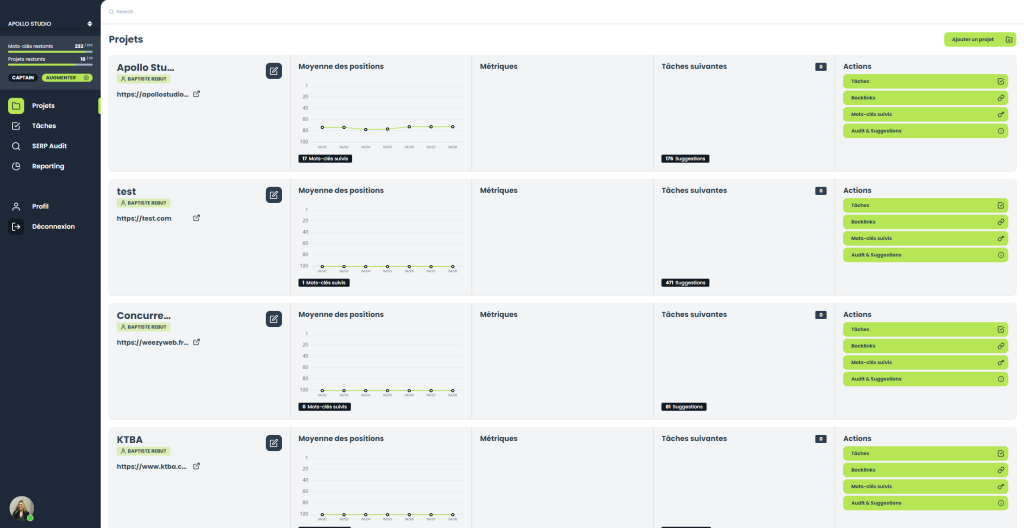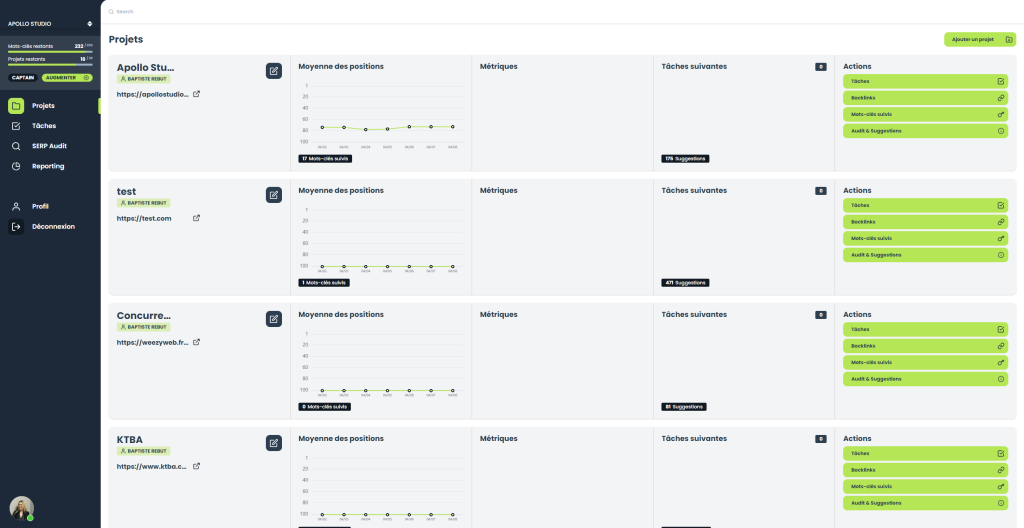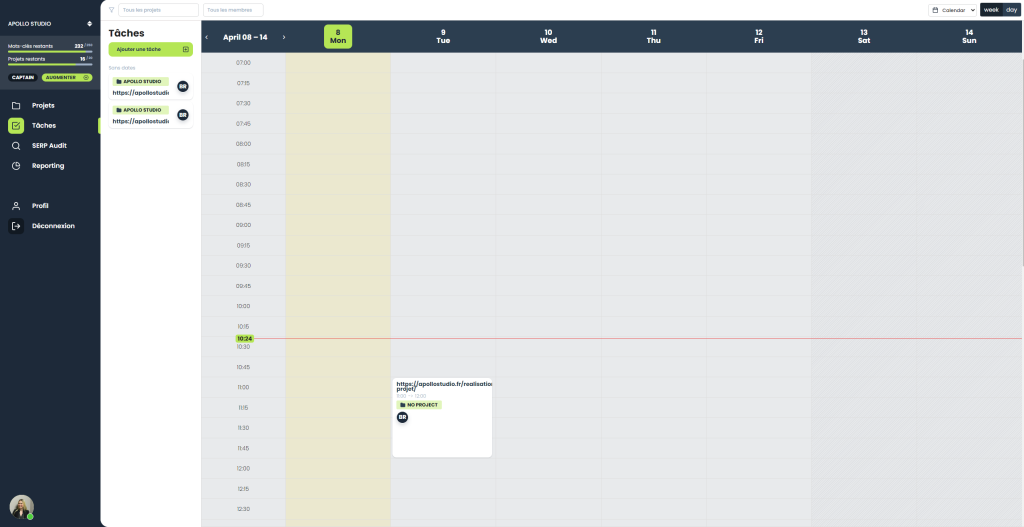SEO project management: the Semnaut tool for a successful SEO strategy
Search engine optimization is a team game. To successfully implement an SEO strategy and move a site up in Google’s results, coordination is essential. On the front line? The SEO project manager.
Mastering SEO project management requires solid skills. You need to be able to define a tailor-made strategy, put together a complementary dream team, select the right tools, plan actions, monitor performance indicators… The project manager must handle it all with brio, or rather with Semnaut 😉.

But it’s well worth the effort. Smooth project management translates directly into concrete results: improved positions, increased traffic, higher conversions. You name it!
Understanding SEO project management
SEO project management is a complex discipline for improving a site’s visibility on search engines. By combining management skills with in-depth expertise in natural search engine optimization, SEO project managers orchestrate various actions to achieve strategic results.
What is SEO project management?
What is SEO project management? Behind this barbaric term lies a rewarding discipline that requires management skills and a thorough knowledge of SEO.
The SEO project manager is a bit like the conductor of a web project. His or her role is to coordinate the various instruments: technical SEO experts, graphic designers, copywriters, developers… The goal? To move the site up the search engine results on strategic keywords for the company.
Why is project management so important in SEO?
To achieve this, the SEO project manager must master four skills to perfection.
The first is an overall mastery of SEO techniques: content optimization, netlinking, user experience…
The second is a keen eye for figures. The project manager must be able to extract data from his Analytics and Search Console dashboards to make the right decisions.
Secondly, they need excellent team management skills to unite their troops around a common vision.
Finally, digital marketing awareness is a plus: understanding personas, customer journeys or the conversion funnel helps identify SEO levers with high business impact. The SEO project manager can thus challenge the relevance of actions and ensure their alignment with the overall strategy.
As you can see, SEO project management is far from a sinecure. But what a motivating challenge for organized, inquisitive minds! And what an impact on business when the magic happens.

Implement productive, cost-effective SEO project management
Search engine optimization (SEO) has become a key element in ensuring online visibility and business success. But to achieve tangible results, you’ll need to implement cost-effective SEO project management. This requires a methodical approach and rigorous coordination of efforts. Let’s take a look at the steps involved in setting up productive SEO project management.
Define your SEO objectives and KPIs
The first step to a successful SEO project is to clarify your objectives. What strategic keywords do you want your site to rank for? What budget is allocated? What type of content should be produced? By answering these questions collaboratively with the customer, the SEO project manager can define a SMART strategy: specific, measurable, acceptable, realistic and time-bound.
He must then translate these business objectives into tangible KPIs, which will serve as benchmarks for assessing the project’s progress throughout its duration.
Build your SEO project team
Once the strategy and KPIs have been set, the project manager can build his team by bringing together the complementary expertise needed to make the operation a success: SEO analyst, web developer, graphic designer, web copywriter, product manager… Each profile brings essential technical skills.
The project manager’s role is to act as manager and coordinator. Their SEO expertise enables them to define strategy and prioritize actions. His human qualities are decisive in federating the team and creating a collective dynamic conducive to achieving this objective.
Choosing the right project management tools
With the team in place, the SEO project manager now needs to select the right tools for the job: SEO tracking software, project management software, collaboration software, reporting software… He or she must identify the solutions best suited to the project’s specific needs and processes, with a concern for integration between the various tools.
The challenge is to have the right technology to plan and monitor progress accurately, share information within the team, and measure the impact on KPIs. The right tools are a major asset for smooth management.

Plan your SEO actions
The next step is to draw up a detailed roadmap for each SEO action to be carried out. The SEO project manager specifies the tasks, their logical sequence, the resources involved, the provisional timetable, and the expected deliverables.
This rigorous planning helps orchestrate the smooth running of the project by anticipating workloads, resource requirements and dependencies between tasks. The level of detail must enable each team member to have a clear vision of his or her scope of action.

Manage progress and monitor results
Finally, the web project manager must set up a dashboard to monitor the evolution of the defined KPIs. This regular reporting of key indicators – SEO positions, traffic, leads, ROI… – enables you to measure the results of your actions and their impact on your objectives.
In the event of any deviation, the project manager can quickly adjust the action plan. This monitoring, based on tangible data, is an essential tool for getting the project from point A to point B. KPIs come into their own to reveal areas for improvement.
SEO is a never-ending task. Between tracking positions, detecting problems and updating tasks, it’s impossible to manage everything efficiently! Fortunately, SEMNAUT centralizes your SEO project for simplified management. With customized dashboards, real-time tracking and automatic alerts, you can keep a firm grip on your SEO. Your customized SEO roadmap has never been so accessible!
Best practices in SEO project management
From communication to data processing and team motivation, discover the best practices that optimize results and strengthen cohesion.
Communicating harmoniously within the SEO team
The first imperative is to constantly improve communication within the team. The SEO project manager must set up an organization to this end:
- Establish a ritual weekly team meeting to review progress, share the latest news and answer questions.
- Set up a central collaborative tool (Slack, Teams, etc.) to easily share information between team members.
- Send out minutes after each meeting, summarizing topics discussed, decisions made and next actions.
- Encourage team members to ask questions as they arise, to maintain continuous alignment.
- Organize informal meetings to reinforce team cohesion.
This proactive, multi-directional communication promotes transparency, commitment and collective agility.
Manage the unexpected and change course if necessary
The SEO project manager must integrate agility into his approach in order to adapt to unforeseen circumstances:
- Anticipate potential risks as early as the planning stage, and provide Plan Bs.
- Reassess the impact of unforeseen changes and prioritize actions accordingly.
- Inform and involve the team to realign the action plan.
- Demonstrate pedagogical skills to explain changes in priorities.
- Know how to make quick but well-considered decisions when adjustments are needed.
- Keep the end goal in mind to ensure consistency of actions over time.
This ability to adapt enables us to deal with unforeseen circumstances without losing sight of our strategic direction.
Capitalize on data to optimize your actions
The project manager, aka the SEO manager, must rely on quantified data to make strategic decisions:
- Regularly analyze KPIs to detect gaps and areas for improvement.
- Cross-reference data on SEO positions, traffic and conversions, to identify the most profitable levers.
- Perform A/B tests to measure the performance of new optimizations.
- Solicit the expertise of each team member to enrich the analysis.
- Prioritize optimizations that generate the best ROI.
This data-driven culture ensures that every action has a tangible impact on the targeted results.
Keep your teams motivated and involved
To cultivate team commitment, the project manager must :
- Give meaning to actions by explaining their impact on common objectives.
- Empower team members by involving them in decision-making.
- Regularly recognize individual and collective contributions.
- Listen to everyone’s suggestions and concerns.
- Welcome constructive criticism without judgment.
This participative and rewarding approach drives teams towards performance.
Celebrating collective success
When milestones are reached, objectives met or significant results achieved, the project manager can mark the occasion:
- Publicly announce the results to all internal stakeholders.
- Review the progress made to measure collective progress.
- Organize a convivial event (afterwork, breakfast, etc.).
- Clearly express your pride and sincerely thank your teams.
These high points strengthen bonds, motivate teams to take on new challenges and help them to achieve their goals.
Manage multiple SEO projects simultaneously with Semnaut
When you’re an SEO project manager, managing several clients and projects at the same time can quickly become time-consuming and error-prone. But don’t worry: tools like Semnaut can help you optimize your project management from A to Z. How about we show you how to get the most out of this dedicated SEO tool?
Centralize all your project data
With Semnaut, no more scattered Excel spreadsheets or Word reports lost in your folders. All your project data is centralized in one place: keyword positions, completed and forthcoming actions, comments, and more. No need to spend hours manually compiling your reports every month!
Customize dashboards for each customer
The great advantage of Semnaut is its ability to create 100% customized dashboards, adapted to each customer’s key performance indicators. You can choose precisely which data to display or hide, and modify the visual appearance to suit your customers’ graphic charters.
Automate notifications and reminders
Semnaut lets you set up automatic notifications and reminders to make sure you don’t forget a thing. Delivery deadlines, customer reminders, team meetings, campaign deadlines… You define these reminders once and for all, and Semnaut takes care of the rest!
Real-time team collaboration
Semnaut encourages collaboration between project team members. Everyone can add comments and tasks directly in the tool, and be notified of updates in real time. Say goodbye to time-consuming e-mail exchanges, and hello to an all-in-one interface.
Save precious time every day
Thanks to all these features, Semnaut saves precious time on a daily basis by automating a large number of time-consuming tasks. The SEO project manager can concentrate on higher value-added, less operational tasks. His team is also more autonomous thanks to this facilitated collaboration.
SEMNAUT is an innovative, game-changing productivity tool for SEO teams managing several projects at once. The time saved is such that some estimate it to be several days a month! So if you haven’t already done so, it’s high time you gave SEMNAUT a try.
